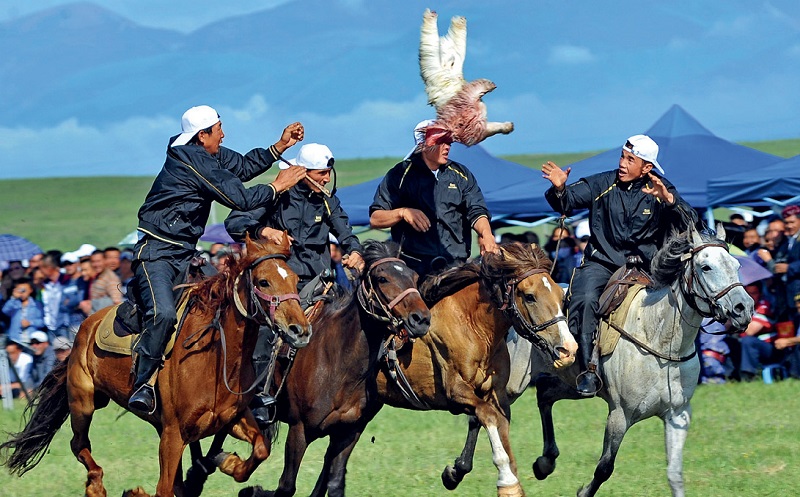
A Uygur Goat Snatching competition is taking place at a horse racing festival in Ili, northwest China’s Xinjiang Uygur Autonomous Region. Yu Xiangjun
 Goat snatching is a traditional team sport popular among nomadic ethnic groups such as the Uygur, Kyrghiz, Kazakh, and Tajik in the western part of Xinjiang. It has been mostly held during festivals or celebrative events. It is a physically demanding sport that requires fast speed, superb balancing skills, and quick reaction. The activity creates scenes so thrilling that it is known as “the brave man’s sport on the grassland.” In 2008, Uygur Goat Snatching was included in the list of national intangible cultural heritage items.
Goat snatching is a traditional team sport popular among nomadic ethnic groups such as the Uygur, Kyrghiz, Kazakh, and Tajik in the western part of Xinjiang. It has been mostly held during festivals or celebrative events. It is a physically demanding sport that requires fast speed, superb balancing skills, and quick reaction. The activity creates scenes so thrilling that it is known as “the brave man’s sport on the grassland.” In 2008, Uygur Goat Snatching was included in the list of national intangible cultural heritage items. One story about the origin of the sport is that historically, since the Uygur people made their living by herding livestock, they needed to fight wolves to protect their cattle and sheep, which later developed into a folk activity where lambs were used as the target instead of wolves.
Riders are divided into two teams, with the number of people in each team ranging from two to a dozen. The team that first deposits the goat carcass at the elevated spot marked as the goal is the winner. Once the match begins, all horse-mounted riders dash toward the goat carcass. It is a test of courage as the players need to use both hands while riding when attempting to grab the goat, resulting in them letting go of the horse reins. This is risky as the odds of riders being thrown off the horse increase. Participants are not only daring, but adept at horse riding. It is an intense and fiercely competitive sport, as some riders pounce from above in a flash, some fight with great force, some hang upside down on the back of their horse, and some even lower their body below the horse’s belly to snatch the prize.
The team that catches the goat rushes to the designated spot while their rivals attempt to block them from reaching the goal and snatch away the animal carcass. Teamwork is also vital for victory, and each team member has a role to play: some are responsible for rushing in the crowd and grabbing the goat, some cover the pack to hide, and others block or catch up the rider with the goat. There is a strategic and tactical element to the sport as well. For example, once the goat is captured, the goat holder needs to be assisted in order to break out of the siege. Some teammates pull the reins, some whip the horse’s back, and some guard on all sides. After a fierce struggle, the party that ultimately throws the sheep carcass at the designated location scores. According to local customs, the winning team roasts the sheep on the spot and shares the cooked meat with other riders.
To this day, this sport remains a classic Uygur sport, and is a source of regular entertainment in villages, and part of sporting competitions in the region. No matter whether it is an official or a spontaneous activity, the exciting and thrilling sport has always been loved by the locals.